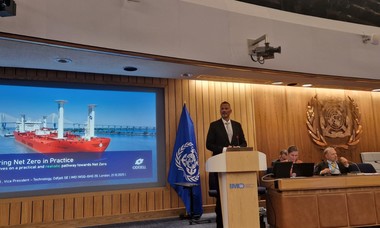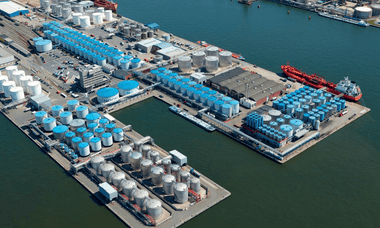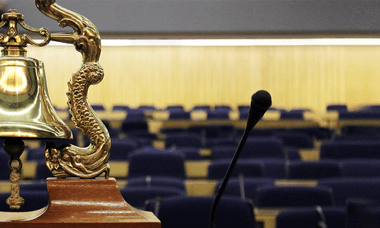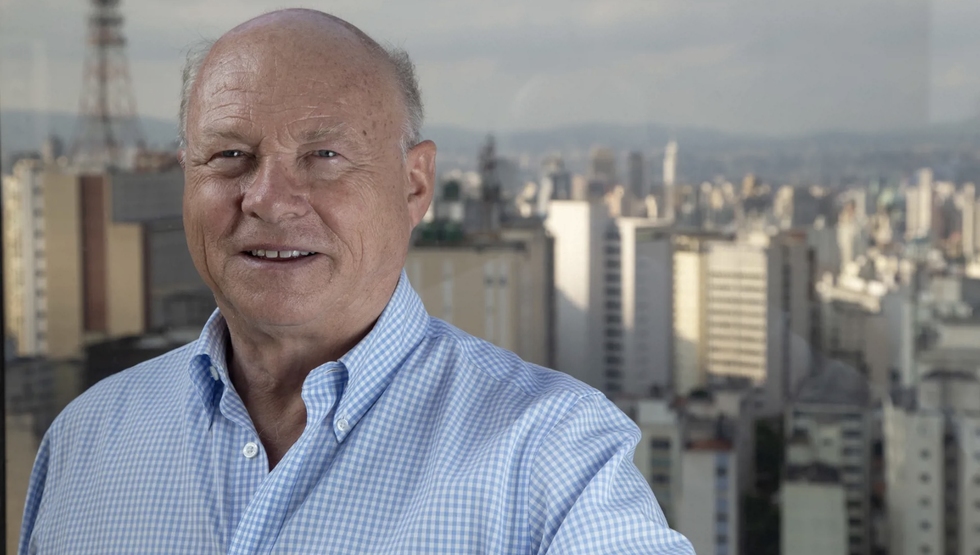
A mission in Brazil turned into a lifelong endeavor and the building of a Brazilian shipping company from the ground up for Knut Øvrebø.
“Wow. The money keeps rolling in,” says Knut Øvrebø, President of Flumar/VP of Odfjell Brazil.
It's Friday, and the weekly report is a pleasant read in the office on the top floor in São Paulo.
"We're making money like never before. Tough years in the market have resulted in a relatively high debt load. Now we can repay and reduce," says Knut calmly. He has experienced both the highs and lows and knows how to stay composed while the mood is upbeat and busy.
São Paulo is one of the largest cities in the world, with over 22 million inhabitants. Odfjell is located on Avenida Paulista, which can be compared to the Champs-Élysées, a hub for finance and politics, parks, and museums. Odfjell owns the top floors of the 19-story building. On the roof above, there’s a helicopter pad.
"We bought these offices 35 years ago. Our team also occupies the 15th floor and half of the second floor. We're around 70 people in the office. We've never been this many. It challenges our space usage. In total, we have around 800 employees in Brazil, including those working at the terminals and on the shipping side," he says while giving a tour of the building and greeting colleagues who are the core of Odfjell's operations in Brazil.
The professionals working with the terminals, ships, import, export, and HSE sit in open office landscapes with no physical walls. Market information flows between departments. Terminal customers have transport needs, and vice versa.
Experts in tax occupy unusually large areas compared to other countries.
"It takes more to follow laws and regulations in Brazil. We put a lot of emphasis on doing things the right way. We benefit from local expertise and experience, having built up our operations step by step from the ground up," says Knut. He is responsible for the shipping side of Odfjell in Brazil.
Interrupted Studies
Born and raised in Bergen, he was ready to pursue economic studies in London after high school.
His father was the director of the student union in Bergen, and no one in his immediate family had worked in maritime industries.
"It was completely by chance that I got into shipping. It was almost a year before my school in London started. I knocked on Odfjell’s door and asked if they could use me for something to earn money for my studies," he says.
He started at the office as a telex operator.
"Half a year later, they took me into the shipbroking department. I did two rounds in the USA and a trip to Brazil. I realized that this was fun and told myself I had to continue doing it. I didn’t go to London, but instead, I got my education at Odfjell. I have a few courses from the Norwegian School of Economics. Otherwise, I’m self-taught," says Knut.
His parents didn’t protest.
"They understood that I was making money and becoming more independent. They could see that I was fascinated by traveling the world, meeting new cultures, and doing business."
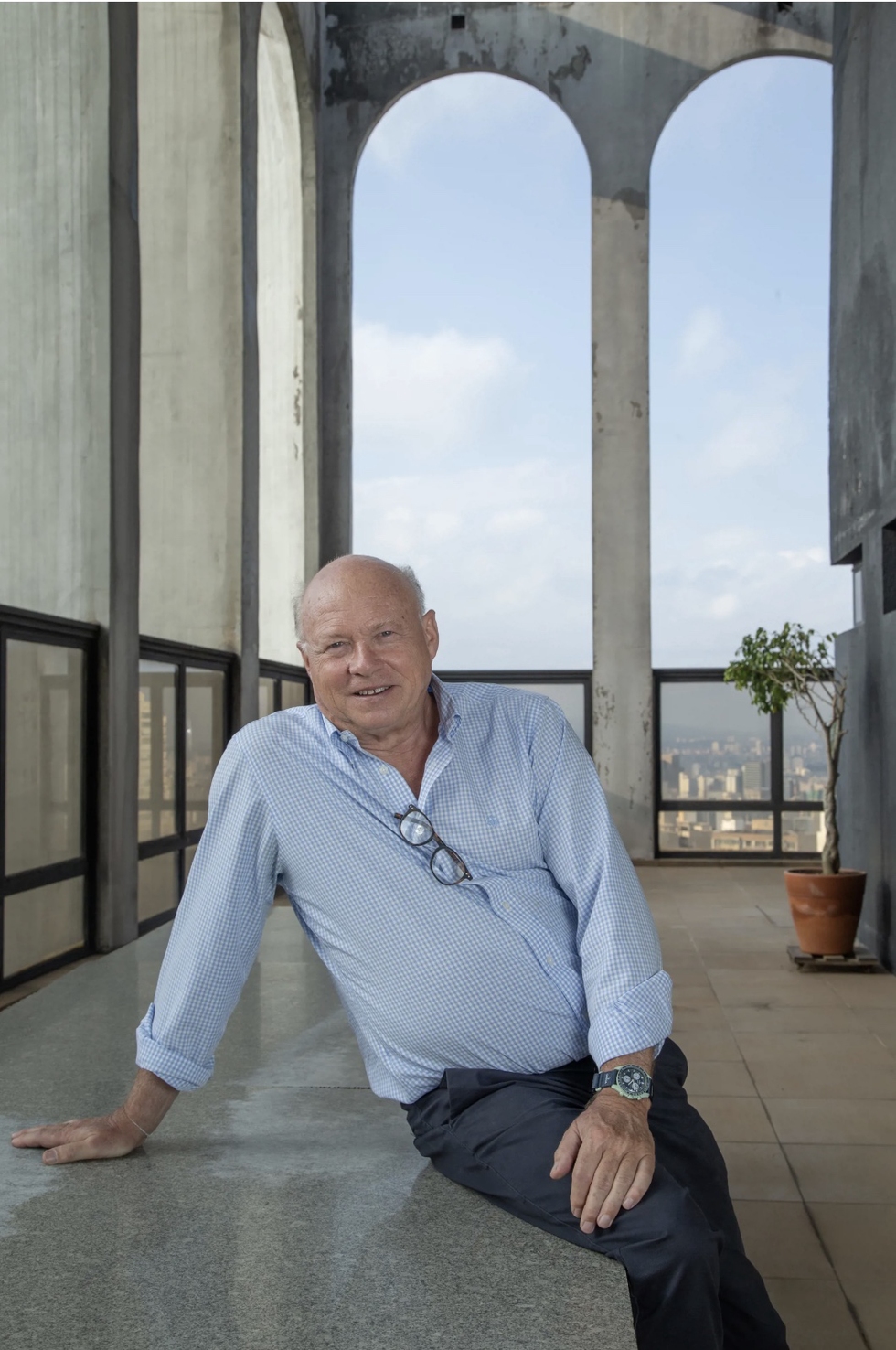
"What fascinates me about Brazil, and all of South America, is that you can 'plant' new business and watch it grow."
Breaking Ground in Brazil
From his early twenties, Knut was sent out on assignments. As a 22-year-old trainee, he briefly lived in New York, before receiving a call from the headquarters in Bergen asking if he would take a six-month assignment in Brazil. He went to São Paulo.
"No one spoke English, and I didn’t speak Portuguese. When I went to a restaurant, I pointed at the food I wanted. The first few months were tough. Then you make friends and get through the challenges. After that, everything changes," Knut says about adapting to a new culture.
That six months turned into five years in Brazil.
Odfjell built its first terminal in Santos in 1974. The terminals came first. Knut worked mainly as a trainee while they built infrastructure on land.
"Then I went back to Bergen and stayed there for 12 years. In 1998, they asked me to return to Brazil. My mission was twofold: to improve our commercial coverage in South America and I got involved in Peru, Chile, Argentina, and Brazil. We also wanted a Brazilian shipping company. It fits very well with our structure here with the terminals. Total solutions provide added value for our customers," he says.
In 1999, the Jebsen group from Bergen and Dreyfuss from France joined Odfjell as a 50/50 partner in Brazil, each owning 25%. The partners were bought out, and Odfjell has owned the Brazilian shipping company Flumar outright since 2008.
“Today, we are a fully functional shipping company here. Flumar has all the functions; crew, technical, administration, accounting, and chartering, both commercially and operationally," Knut says.
The desire for full control stems from the framework around operations.
"The major challenge here is actually staffing. According to Brazilian law, you must be responsible for and own the crew. There was a time when we used an agent office for recruitment, but we decided we wanted everything in-house. This has to do with maintenance. So, we’ve built up what we call a fully integrated shipping company."
The startup phase had a steep learning curve.
"We bought some older tonnage and struggled to make money at first because of maintenance costs. Operating under the Brazilian flag costs extra. You can expect to pay 2.5 times more than operating a ship internationally. This has to do with the crew, but also maintenance. Imported spare parts are highly taxed," he says.
A ship model in the office landscape reminds him of one of the milestones during the construction of the Brazilian shipping company.
"We wanted to build a new chemical tanker in Brazil, but the price was three times higher. This made the project impossible. A European shipping company had a ship under construction in South Korea that they wanted to sell. We became the first company to import a new ship to Brazil. It was a big deal; we paid taxes and everything, but feared the union would block the ship from docking. The day before the ship’s arrival in Brazil, we changed the port. We managed to get the ship in within 3-4 days and nationalized it, while other shipping companies have taken years to do the same".
Another critical crossroads came in 2009, a year after the financial crisis hit.
"I went to Laurence Odfjell and said, 'We need 60 million dollars to get Flumar back on track.' I got the money, but I felt the responsibility," Knut says on a day when the charts are steering upwards.
"Today, we operate with seven chemical tankers here, and we’ve done relatively well. Flumar operates only along the coast of Brazil. Odfjell has some service between Brazil and Argentina, and dedicated vessels running between Peru and Chile".
When asked how they have been received as a Brazilian shipping company with Norwegian ownership, the answer is:
"We have had the philosophy that we don't want to force our customers to use us, even though we have both ships and terminals. This attitude is appreciated. At the same time, the situation in South America is more or less the same everywhere: there’s very little terminal space available. The fact that we can offer customers terminal space is a strength for us. None of our competitors have the same setup as we do," Knut says.
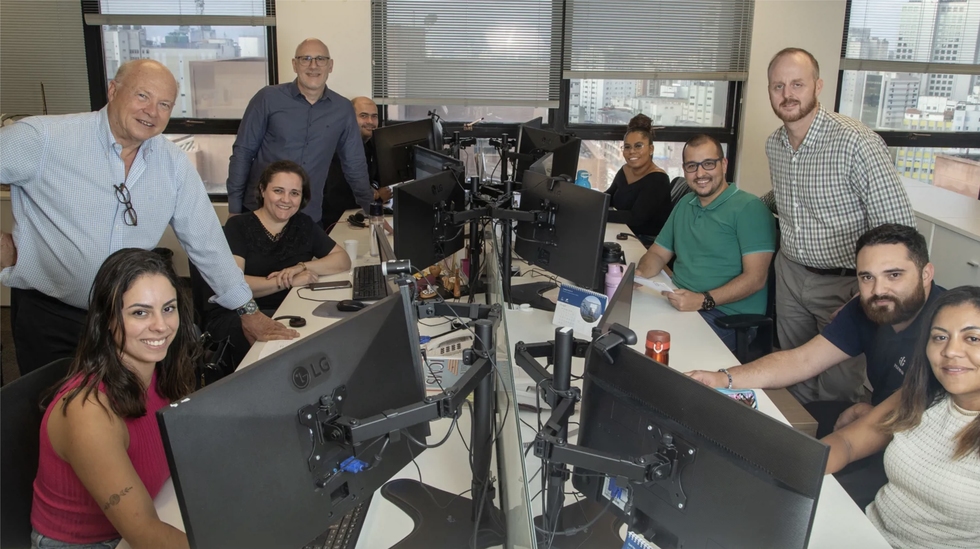
In the office on a Friday afternoon, with a great atmosphere and good rates.
With a Family-Owned Shipping Legacy
He describes the terminal business as an adventure, and the magic rubs off on the shipping side.
"We work closely with the terminal business. Odfjell has built terminals along both coasts of South America and is one of the largest terminal operators."
Øvrebø points out that the ownership of the projects has been deeply rooted in the Odfjell family.
"Dan Odfjell, along with his brother Carl Fredrik, was the driving force behind building the first terminals. The next generation, Laurence Odfjell, has been very involved in the later projects".
He has worked under three generations of the Odfjell family.
"As the youngest in the office in Bergen, I often drove Odfjell senior to and from work. In Brazil and South America, I’ve worked closely with the next generations, who have been deeply involved in the development there. We’ve known each other well. Odfjell would never have been in the position it is in South America if it weren’t for the family. They’ve been tough and demanding, willing to take risks, and fascinating to work with. They expect results. Having the owners behind you adds value and security. They know you and know who you are. You're not just a number," says Knut.
He himself has grown with Odfjell, which has been his only employer throughout his career.
"I’ve probably changed as a leader over the years. It’s a process. I think I was more authoritarian as a leader before, and now I’m more democratic. We’ve grown, and one must adapt to the realities. It’s important as a leader to know what things look like. I’m the only one in the office five days a week, even though everyone, after the pandemic, can work from home one day a week. My door is always open," says Knut about his daily routine.
"It's very important how you communicate with people here. There are a lot of emotions at play. It has to do with culture. Even though I’m Norwegian, I’ve lived here long enough to understand how things should be done. You have to live here to truly understand it," says Knut.
He has lived in Brazil longer than in Norway.
"Colleagues say I’m actually more Brazilian than Norwegian, but I have roots in Norway and my feet firmly planted. At the same time, I experience identity as a somewhat fluid concept."
When he returned to work in Norway in the 1990s, it was with his Brazilian wife and their two children.
"She was very well received, especially by the Odfjell family, and enjoyed life in Bergen. When we moved back to Brazil for work, we, as a family, agreed to stay for 3-4 years. But then she got cancer and passed away while the children were still relatively young. We agreed to stay in Brazil. After school and studies, the children now live in Norway. My son lives in Bergen and works in AI startups, while my daughter has settled in Oslo and works for a consulting firm," says Knut.
He still visits his mother in Bergen regularly.
"She's 92, manages on her own, and has a crystal clear mind. She finds it boring that I live so far away. But I’m quite often in Bergen. It’s important to meet face-to-face for us who operate down here. We need to discuss what’s happening and what positions we need to take. I’m very personal and much prefer meeting in person than writing long reports. Nothing is more efficient than face-to-face meetings," he says.
He remarried in Brazil. His wife is an internationally renowned jewelry designer. Her pieces can be seen on the red carpet at the Oscars. Curiosity led us to her showroom in São Paulo’s financial district, where a wall is adorned with stars like Meryl Streep and Mary J. Blige wearing her jewelry.
"I find that being married locally makes a difference. For one thing, the language. You develop personal relationships and connect with people in a different way. My wife runs a top-tier business. Our family and friends circle can help with our business, especially in terms of making contacts," says Knut.
He himself opens doors for Norwegian businesses through roles in the Norwegian-Brazilian Chamber of Commerce and ABRAN, an organization for Norwegian shipping companies in Brazil.
"Team Norway consists of the Chamber of Commerce, the Embassy, the Shipowners’ Association, and Innovation Norway. Here, you get a chance to share some of your experiences in Brazil and promote Norwegian industry. We also arrange meetings with Brazilian politicians and the administration in Brasília and frame government visits," he says.
Nordlyset is another organization dedicated to charity work, supporting half a million underprivileged children. Scandinavian companies donate products that are sold for the benefit of the children. It also serves as good marketing.
He sees the results of working within these organizations. For example, Norwegian offshore shipping companies have made great strides.
"There's huge potential for Norwegian industry to deliver here. If you secure a solid trade agreement, it can involve anything from the shipping industry to shipyards and the salmon industry, to name a few. Brazil is emerging as one of the leading countries in the world. It’s rich in raw materials and people. Hydropower and renewable energy in alternative fuels like biofuels are abundant. The path to becoming carbon-neutral is short," says Knut.
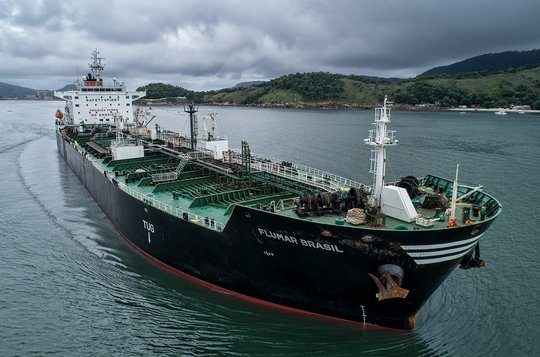
One of Odfjell's ships in Brazil: Flumar Brasil.
Seeing Growth
With a long presence in Brazil and involvement in developing infrastructure like terminals, Odfjell/Flumar participates in a program that is partially subsidized by the state.
"We’ve gained access to a fund that subsidizes the construction of new tonnage. We chose to build barges without engines, which were delivered in Belém last year. They are 70 meters long, 20 meters wide, and carry 4,000 cubic meters. The barges are now in operation on the Amazon rivers. We saved 65 million NOK on the project. It’s going really well. We’re considering building more barges," says Knut, who travels to follow up on the project and build new connections.
"A new railroad is improving distribution between the east and north of the country. The entire logistics system is changing. Once again, we benefit from the terminals to spot opportunities. It’s usually the terminal that gets requested first," he says.
The work he’s been part of, building a shipping company from scratch in a country full of challenges, has given him many memories and experiences.
"What fascinates me about Brazil, and all of South America, is that you can 'plant' new business and watch it grow. As Norwegians and Europeans, we’ve been very well received here. That’s my story," Knut concludes.
